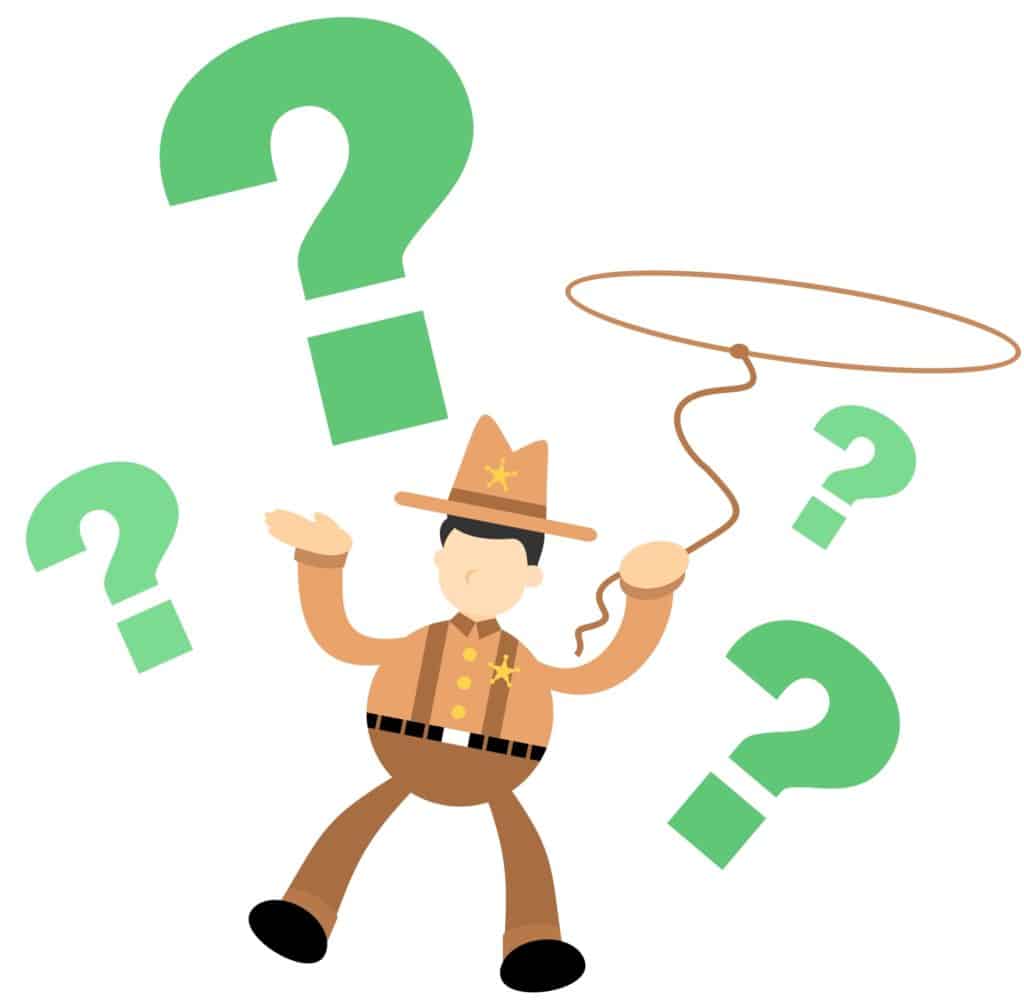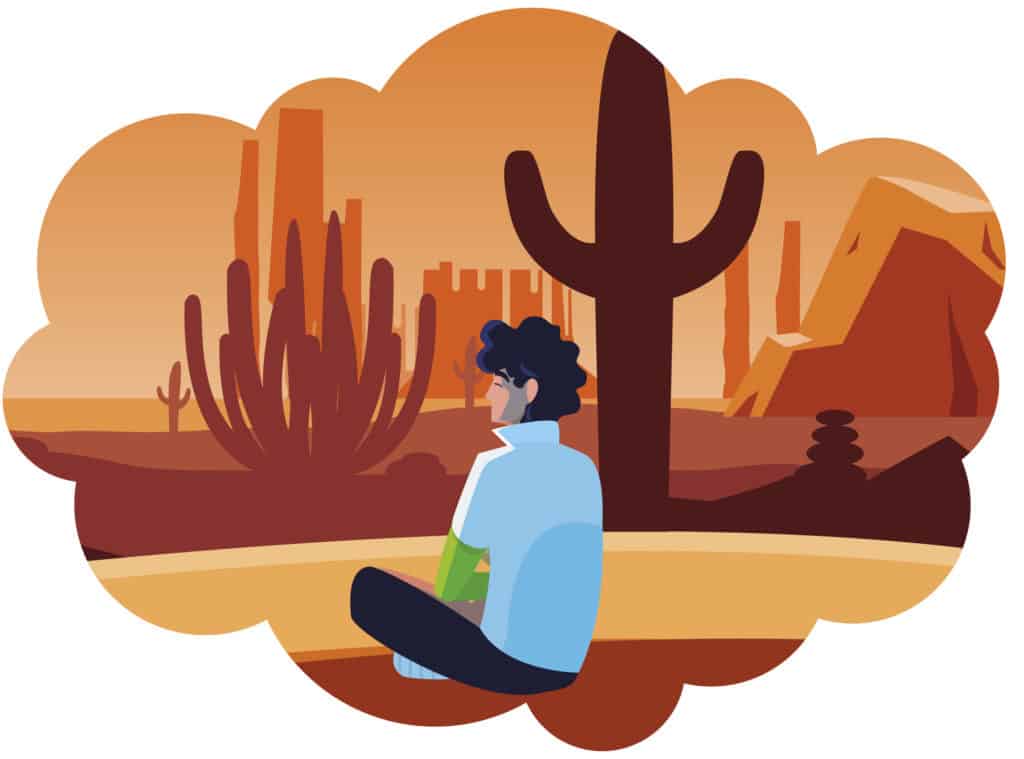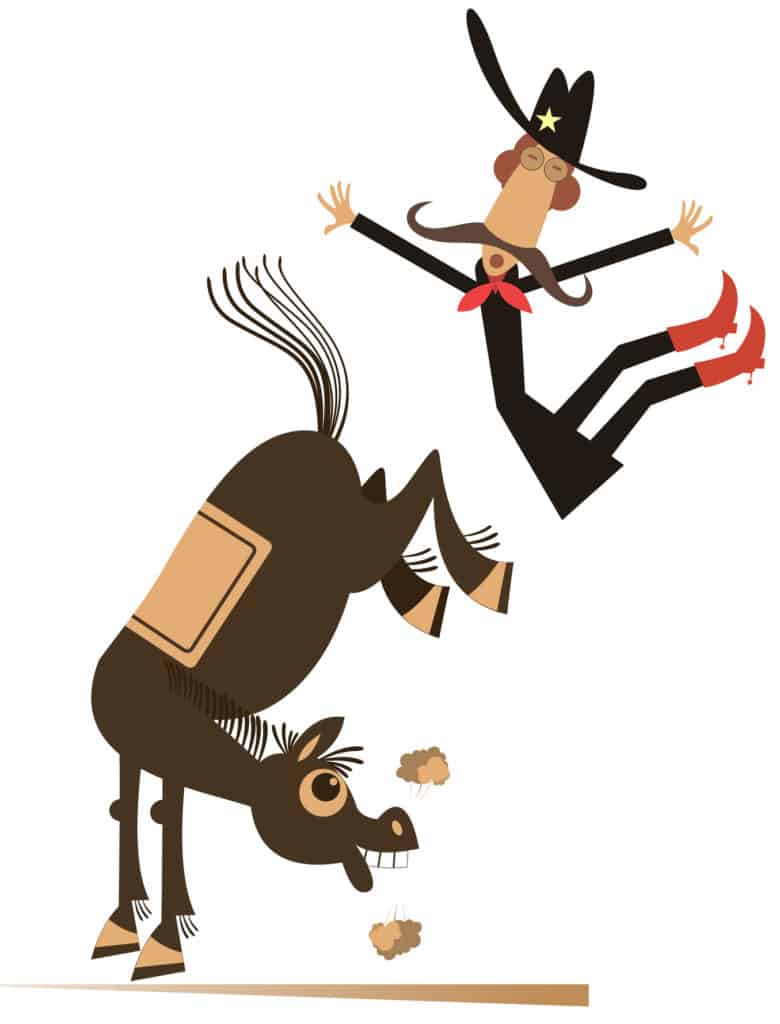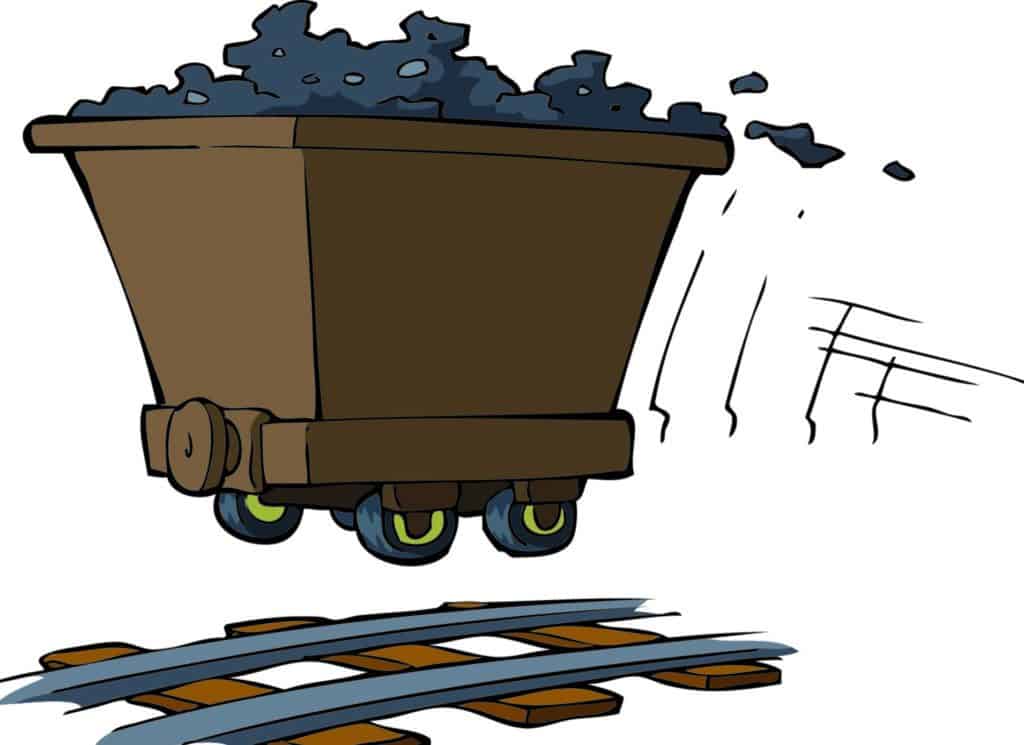Planning on using black hat SEO techniques? They seem like a shortcut, but you are in dangerous quicksand territory…
Well, howdy there! The internet sure can feel like the frontier from them there olden times. Can’t it? *slaps knee and shoots a pesky Coyote*
Like the wild west, the internet often seems like a vast landscape that’s difficult to navigate. And, just like Spaghetti Westerns, there are always evildoers getting up to no-good – such as the black hat cowboy.
Synonymous with villainy, the ‘black hat’ in SEO attempts to manipulate search results by bending guidelines set out by search engines. It’s a bit like the modern equivalent of holding up the bank train, by employing misinformation and exploiting the code of conduct.
More Blogs From DRPT
What Is Google MUM?
What To Do When Someone Steals Your Content
The Importance Of Tracking Your Website Metrics
It might seem like an easy boost for your site, but trust me, partner, that black hat ain’t nuthin’ but trouble.
Many big companies like the BBC (British Broadcasting Corporation) have been identified for various black hat tactics and, as such, have been downgraded in Google rankings (other search engines are available). And you don’t want that. Just like you don’t want ol’ Skull Crusher Harry hunting you down for that card game payment.
These sketchy tactics cause a massive decrease in organic traffic and can be mighty punishing for your web page. Sadly, you won’t see John Wayne riding on the back of his trusty steed coming to save your site. It’s up to you to wear the white hat and follow the path of justice.
Be your web site’s own Sheriff and uphold the law! You will reap the benefits, rather than dancing the Bolero upon the end of the SEO noose.
What Are Black Hat SEO Techniques?

Black hat tactics aren’t technically illegal, per se, but using them will violate search engine guidelines. That means your rankings will take a hit. Y’know, like how Abraham Lincoln took a ‘hit’.
And if your rankings take a hit, you are going to lose those vital leads. You don’t want them tumbleweeds heading your way.
Black hat SEO techniques manipulate search engines and profit by exploiting Google’s search functions and algorithms.
It can be catastrophic for SEO if these techniques are used, often resulting in penalization of the site. Clint Eastwood won’t be able to save you from this one.
Search engines – like Google and Bing – will ensure your site is dropped down the search rankings. The result? Less publicity and dwindling organic traffic.
Sticking To The Right Path
Luckily for us, SEO algorithms are one step ahead of these black hat scoundrels.
Search engines (like Google and Bing) have guidelines to follow, and explanations for keeping you right when tackling the online frontier.
The information provided in these guidelines should keep you on the right path and prevent you from becoming a ‘Black Hat Villain’ – which may sound like a cool name, but if Google slaps your face upon a Wanted poster, you are going to suffer.
How Can I Avoid These Black Hat SEO Techniques?
To avoid ’em, you’ll need to know ’em.
Here are our top 10 black hat SEO tactics to avoid:
Content Automation
Robots might be the future of content at some point, but people are the present.
While computers may be intelligent, we’re not at R2-D2 levels quite yet. There’s a good reason why people are still writing online content and not leaving it up to AI (Artificial Intelligence).
A human writes the best content, and search engines know this, too. Just like your trusty horse knows not to spoil that moment when you first enter town for that badass first impression.
Content automation refers to writings which a computer program has generated, and are done so to manipulate the search rankings, rather than play by the rules. It exploits the algorithm, and is not intended to help users with their initial query.
Black hatters often stuff the text with keywords, meaning the actual content doesn’t make much sense to the reader. This won’t benefit visitors looking for legitimate answers, and it won’t help your site after it’s been penalized.
You will struggle to get your rankings back after being penalized, especially if you end up in this situation regularly.
 Keyword Stuffing
Keyword Stuffing
Keywords are great! (Just don’t overdo it.)
Frequently overusing keywords can be picked up as “keyword stuffing”, another black hat SEO technique that tries to boost the site’s ranking inorganically.
Keywords and/or numbers, which have no relevance to the topic and have only been included to boost the site’s ranking, are spammed on the site page in an attempt to exploit SEO.
Akin to an excess of dynamite lurking down that enclosed mine, it will not end well when things become lit. Whereas that crater is metaphorical, when you are caught spamming, the detrimental impact is real. G’hurt.
Keep yourself in the clear by remembering that overly repetitive keywords, or phrases, without context will have an incredibly negative impact on your site. This can include repeating city or area names that you want to boost the site’s visibility in.
Link Schemes
Stop. Think. Link.
Any links that aim to manipulate Google’s search ranking of a page would be considered a “link scheme.” Any links that have been traded for goods, services or funds can be regarded as part of a link scheme.
But wait! Don’t be running to rob the town bank just yet. It’s effectively a kind of illicit trading – similar to that time Patrick “D’you Want Some Of This” O’Fist tried to trade his wife in order to pay a bar tab.
Any form of auto-generation in terms of links is a form of black hat practice. Engaging in exercises of this kind will incur the wrath of Google’s penalization under SEO guidelines. You don’t want that. Trust us.
 Cloaking
Cloaking
Be transparent; you have nothing to hide (unless you’ve poisoned the waterhole).
Under the veil of cloaking, large amounts of text can be hidden underneath an innocent-looking image. Where we might see a form of media, the text link hidden beneath may be littered with out-of-context keywords, and other linked search terms, which could be trying to manipulate the search engine.
Although this may initially boost the page in the search engine’s ranking system, it will quickly become recognized by the algorithms and then harshly penalized, spiralling the page into the depths of the search results rankings.
Hidden Content
You’ve spent so much time on making a site. Why not make sure everyone can see what you have to say?
The algorithm is far beyond being fooled by sneaky formatting. Like a snake in your boot, this black hat SEO technique hides in plain sight.
Examples of this include using the same colored text as the background to blend in and positioning text out of sight of the visitor. An initial (slight) boost in rankings isn’t worth the pain that your site’s penalization will bring.
 User-Generated Spam
User-Generated Spam
Cut the bull, get to the point!
Anything that violates a search engine’s quality filter is classified as ‘spam’ – a dangerous black hat SEO technique. And that’s not the tasty tinned variety, either. We’re talking about the ‘you are going to get banned from Google’ type of spam.
Prevent yourself from leaving a link to your website in the comments field of a page. It sounds relatively simple, but if you insist on abusing the comments section, you will do yourself an injustice. Akin to that time ol’ Danny “Horse Tickler” Hopkins tried to introduce himself to the Sheriff’s new steed.
To stay in the Sheriff’s good favor, stay away from spam. The good news is you can monitor your page for any user-generated spam in the form of unnecessary or repeated comments, and report them to your webmaster where appropriate.
 Scraped Content And Plagiarism
Scraped Content And Plagiarism
Plagiarism is your way of telling everyone that you have nothing interesting to say.
It’s beneficial to include information from various sources, but it can be highly detrimental to copy information directly from another site as this can lead to plagiarism strikes.
“Don’ be looking for nuggets in ‘nother fella’s mine, y’hear!”
– Ol’ Prospector Willy 2021.
Just like the preceding black hat SEO techniques in this list, scraping content directly from other sources will result in the penalization of the site – especially if you don’t reference your sources.
Anchor Text Spam
Anchors away!
As you’ll probably already know if you’re reading this, links are essential for your digital stall. Linking to your own site can benefit organic traffic and keep you on the right track for Search Engine Optimization.
However, reusing the exact phrase with the same link will trigger the search engine’s spam filter and cause your page to plummet in search rankings.
Try to work away from anchor text spam, or your ranking will nosedive like a runaway mine cart. Yikes!
 Thin Content
Thin Content
Avoid thin content. Think thick (careful now)!
Like a lone cactus in a vast desert, web pages sparse in content won’t keep your townsfolk happy. Search engine filters will pick up on thin content as a means of manipulating optimization through a small amount of keywords.
Like keyword stuffing, sites can include large amounts of meaningless content with scattered keywords to exploit filters. To avoid this, make sure to create information-rich pieces of content.
Malicious Behaviour
Let’s go viral! (or maybe not)
Online security is important to keep your site safe. Content that has been infected with trojans, viruses, or any malware, can be identified as having malicious intent. And that’s guaranteed to bring the Google gunslingers into town, where they won’t stop until you are filled with lead. Um, I mean, de-listed.
As you would expect by this point, malware and malicious behaviour lurks under the ‘black hat tactics’ umbrella, and should be avoided like the Skinwalker Ranch.
So, how can you stay protected? Start by making sure your software is updated, and limit any access to modify your website. Keep an eye out for any dodgy links, downloads, or suspicious files.
Engaging with viruses may well limit your webpage, but it can get much worse than that. It can potentially lead to the site being removed completely. Talk about ‘out of the frying pan’ and into the flaming cactus patch…
Remember, we want the page to abide by SEO white hat tactics, and not spread any ill-intended malware to reach the higher rankings.
Keeping To The Trail
Keeping your white hat on might seem like a difficult task after reading all of this. But don’t be running for the saloon doors just yet!
We’ve got some tips to help you stay on the right trail:
Answer Your Visitor’s Queries
Have you ever walked into a room and forgotten why you went in in the first place?
Don’t make your visitors feel like this.
Your website should answer your visitor’s initial query, meaning it should meet the “user’s intent.” Re-read your content to prevent confusing misdirects.
The keywords you use = the content that you’re providing.
You can really boost your rankings by ensuring that your keywords and content match your visitor’s intended query.
Quality Content
Make sure your content is thick. Thick like a delicious buffalo steak.
Thin content not only pushes your ranking down, but it’s also disappointing for visitors looking for information-rich content.
Make sure you know which keywords you should be aiming to include to keep your site ahead of the game.
 Meta-tags
Meta-tags
Meta? I hardly know her! (Apologies for the pun…)
Meta-tags are the best way to make your site more visible, but make sure to keep them relevant. These tags can be used to help search engines discover your content in a ‘legal’ fashion that should help you avoid the gallows.
Keep It Simple
The last thing you want to do is make the coding for your site look like The Matrix after a wild moonshine binge. The search engine algorithms won’t like it, and it could have further repercussions for your user’s experience.
Simple coding will boost your rankings in search engines as it keeps everything transparent and concise, and it also means quicker loading times.
People don’t like waiting. Whether that be for a bus, their meal, or their booking with Madam Swish. Courtesy of slick coding, there’s less chance of your visitor bouncing.
This all helps keep the site running smoothly. As smooth as that first whisky after a week on the mountain trail.
Townsfolk are far more likely to stay on a page that loads quickly, rather than one that feels like it’s being delivered by an asthmatic mule.
This Town Ain’t Big Enough For The Both Of Us
As Clint Eastwood once said – “You see, in this world, there’s two kinds of people, my friend – those with loaded guns, and those who dig. You dig.”
We keep ourselves fashionably correct by wearing the white hat.
The best advice for you, partner, don’t end up on the wrong side of the law.
Keep a lookout for more darn tootin’ content to help your site reach its true potential. In the meantime, if you need further assistance in identifying black hat SEO, or require help with anything realted to Search Engine Optimisation, get in touch with us through our contact page.
—
We apologise unreservedly to all diehard fans of Western films for our terrible puns and sense of humour.



 Keyword Stuffing
Keyword Stuffing Cloaking
Cloaking  User-Generated Spam
User-Generated Spam Scraped Content And Plagiarism
Scraped Content And Plagiarism  Thin Content
Thin Content
 Meta-tags
Meta-tags 




